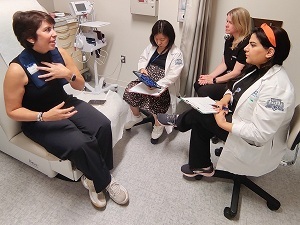First Michigan Patient Uses AI-Powered 'Brain Pacemaker' for Parkinson's

When Evonne Simoff was diagnosed with early-onset Parkinson's disease at 46, medication controlled her tremors enough so she could keep golfing and hiking. But over the next 12 years, the drugs lost their effectiveness, and taking pills up to six times a day left her drained.
"I couldn't hide the tremor anymore, no matter how much medication I was on," said Simoff, now 58. "I was having trouble walking. I was having trouble golfing. I was taking three-hour naps during the day and still sleeping eight hours at night. I was exhausted all the time. That was no life."
Determined to regain control, Simoff underwent deep brain stimulation (DBS) surgery in October 2024. Within weeks, her energy returned. She reduced her medication to an occasional pill and even gained about 30 yards on her golf drives, thanks to improved muscle coordination.
When a new form of DBS powered by artificial intelligence became commercially available this spring, Simoff welcomed the upgrade. Shortly after, the Northville woman became the first person in Michigan to start using adaptive deep brain stimulation (aDBS) for Parkinson's. Her neurology team at Henry Ford Health, led by movement disorder neurologist Dr. Zehra Farzal, activated the new technology May 5.
Acting like an AI-guided pacemaker for the brain, aDBS monitors brain activity and automatically adjusts stimulation in real-time to ease symptoms, such as tremors, and help coordinate activity. The recently FDA-approved technology from health care technology company Medtronic marks a new era in Parkinson's treatment — offering a personalized, high-tech approach to managing a complex, progressive disease that currently has no cure.
"Every Parkinson's patient experiences different symptoms that can fluctuate and progress in different ways," Farzal said. "Adaptive DBS holds tremendous potential because it's tailored to each person's unique brain activity, allowing for a more precise and responsive approach to controlling symptoms."
DBS is often used to treat symptoms of Parkinson's disease, essential tremor and dystonia. Surgeons implant electrodes in targeted areas of the brain and place a small, pacemaker-like device inside the chest. This device sends electrical pulses through the electrodes to the brain, helping control various symptoms.
With traditional DBS, stimulation is delivered continuously within parameters set by a patient's neurologist. Patients can use an external controller — roughly the size of a cellphone — to make minor adjustments to their device (for example, lowering stimulation at night to sleep more easily).
"Many DBS patients don't feel comfortable adjusting their device settings outside their doctor's office," Farzal said. "Adaptive DBS removes that burden from the patient, while also delivering a more personalized stimulation that is fine-tuned to what their brains needs at a given moment."
Simoff, a tech-savvy former civil engineer, was an outlier among DBS patients, frequently adjusting her stimulation throughout the day. Even so, she sees tremendous benefit in automating that function.
"No matter how hard everyone tried to pinpoint the right settings of my unit, AI technology is just better at keeping track than I am," she said. "It's helping identify exactly where and when I need stimulation and at what intensity my brain needs it."
Many Parkinson's patients eligible for DBS may also be good candidates for aDBS. Currently, Medtronic is the only company with an FDA approved system for qualified patients, called BrainSense™ Adaptive DBS. Parkinson's patients already using the company's Percept DBS device can likely have their physician activate aDBS therapy through a process similar to installing a software update.
For Simoff, activating aDBS was quick and seamless. The activation took place during an in-office appointment with Dr. Farzal at Henry Ford West Bloomfield Hospital. A few weeks into using aDBS, she already noticed the technology start to self-regulate when she is golfing, walking and cooking at home.
To those hesitant about DBS or nervous about AI, Simoff shares this advice: "If people have the health insurance and pass the screening, I would say run — don't walk — to have this done. It's given me back years. I know it doesn't fix Parkinson's; it only helps with the symptoms. It's still the best thing I've ever done."
###
MEDIA INQUIRIES: mediarelations@hfhs.org
.svg?iar=0&hash=F6049510E33E4E6D8196C26CCC0A64A4)

/hfh-logo-main--white.svg?iar=0&hash=ED491CBFADFB7670FAE94559C98D7798)









